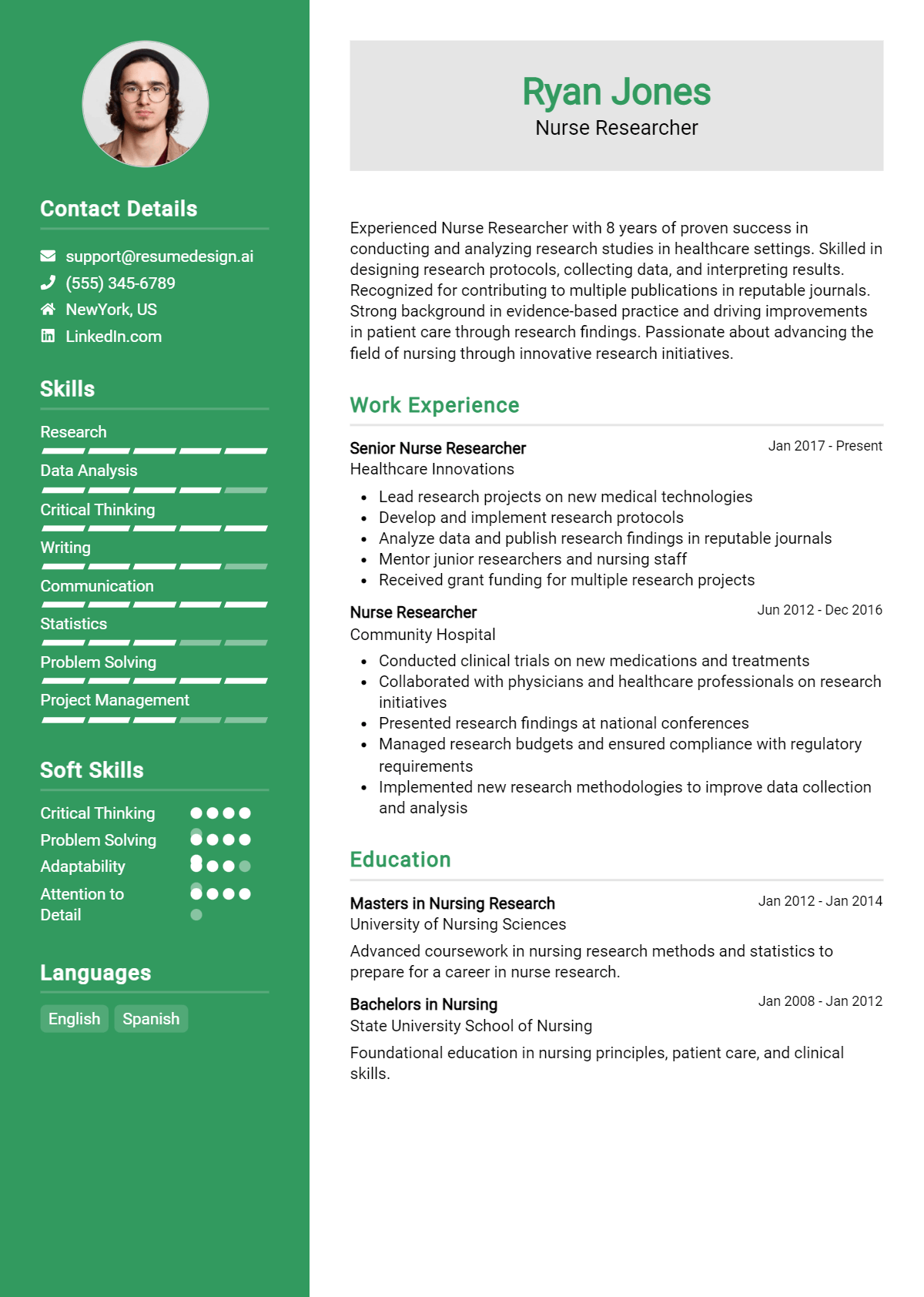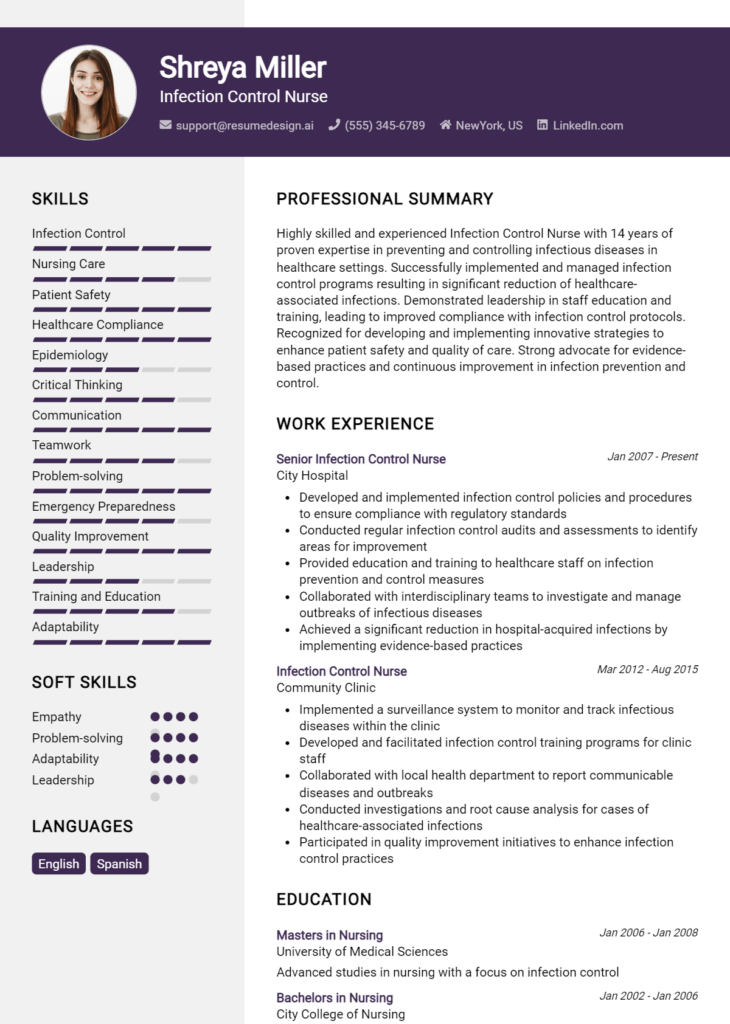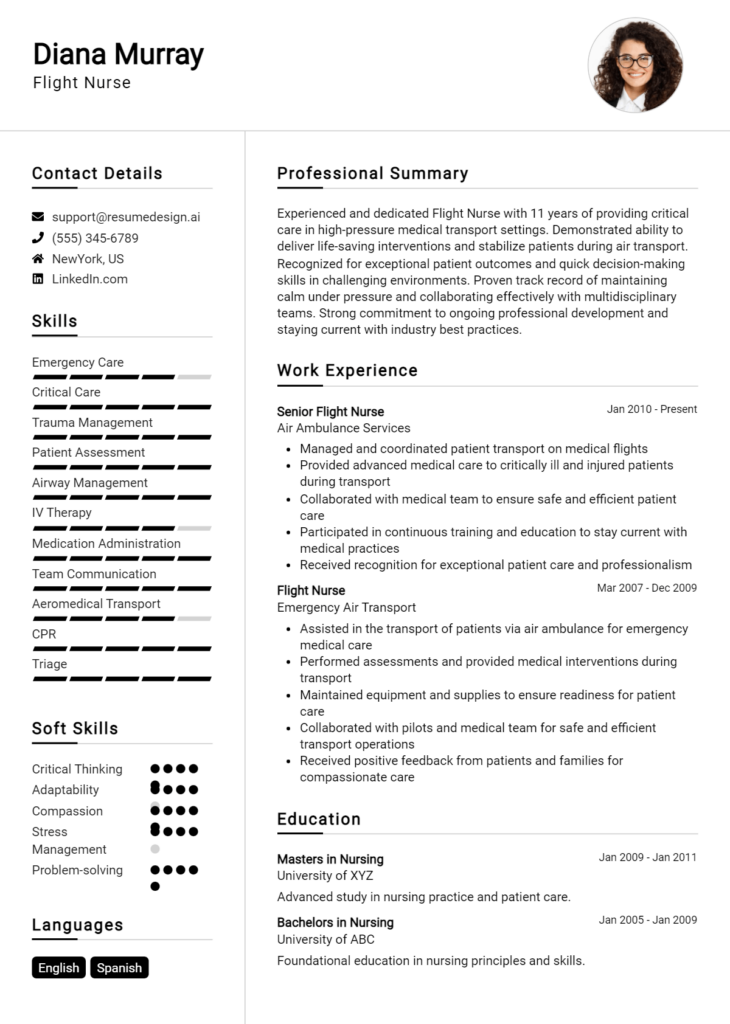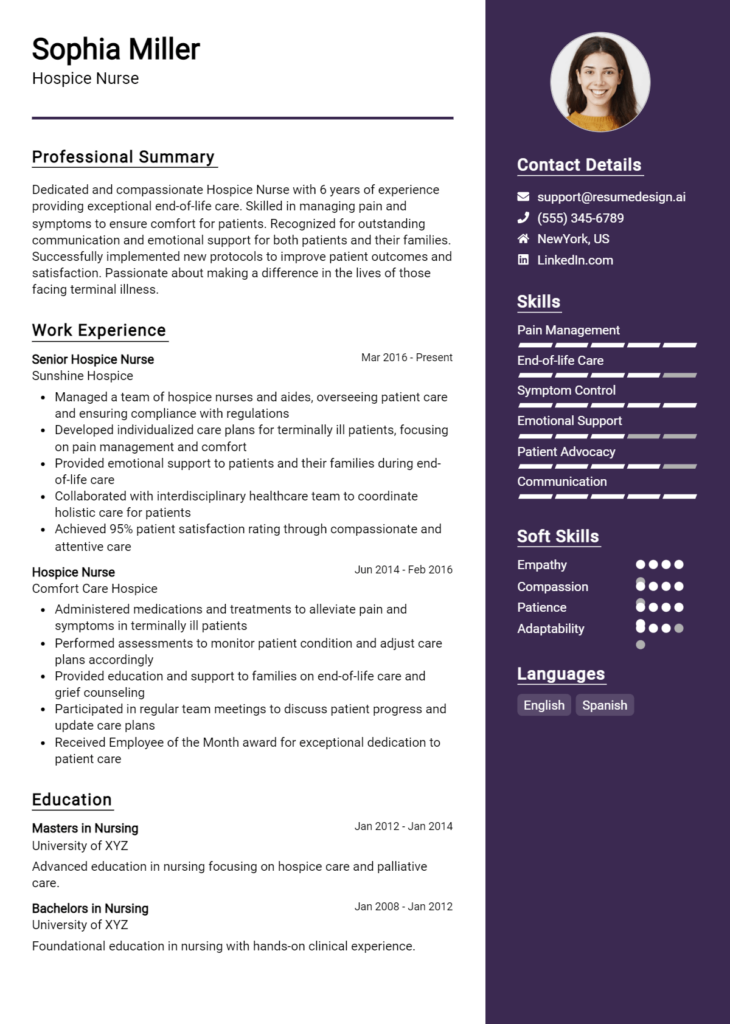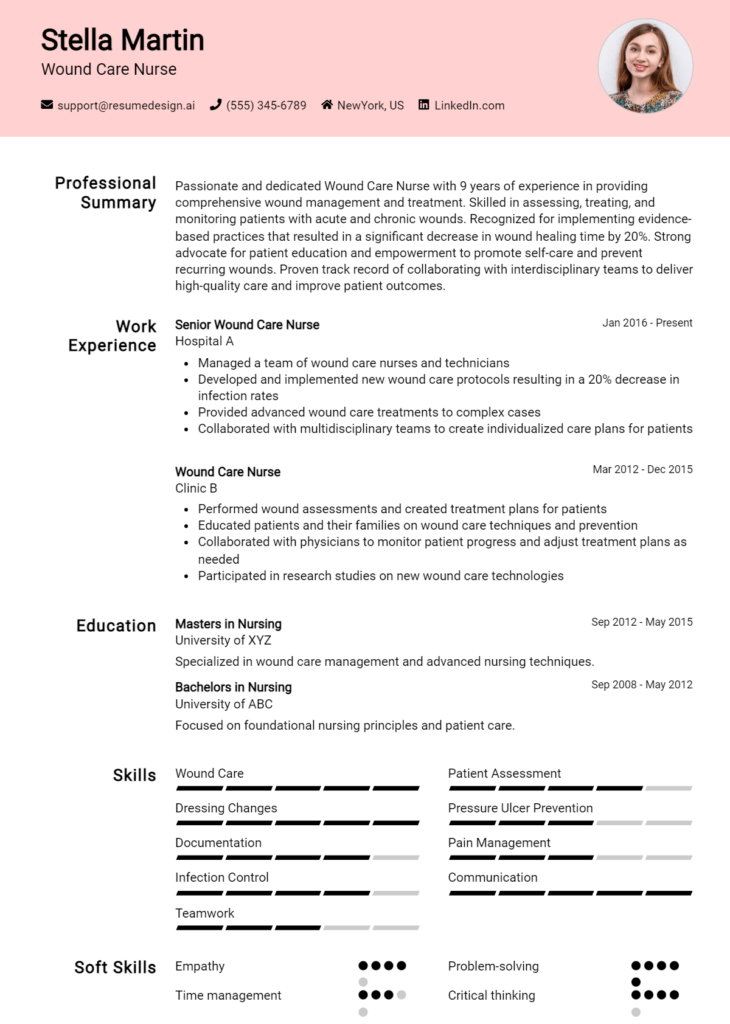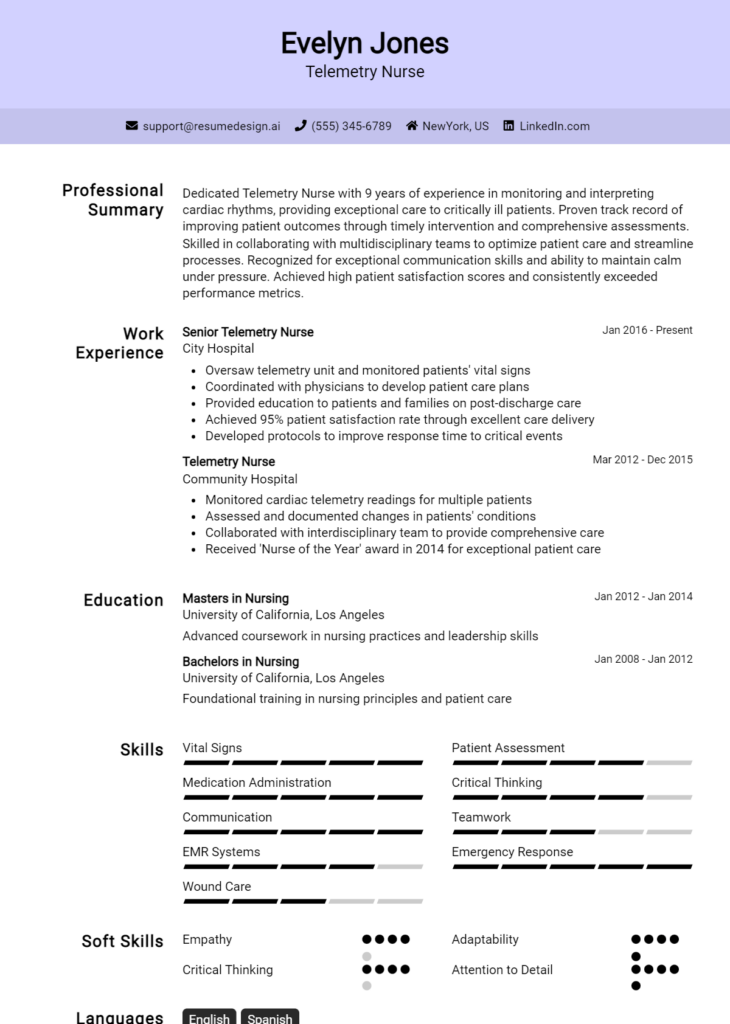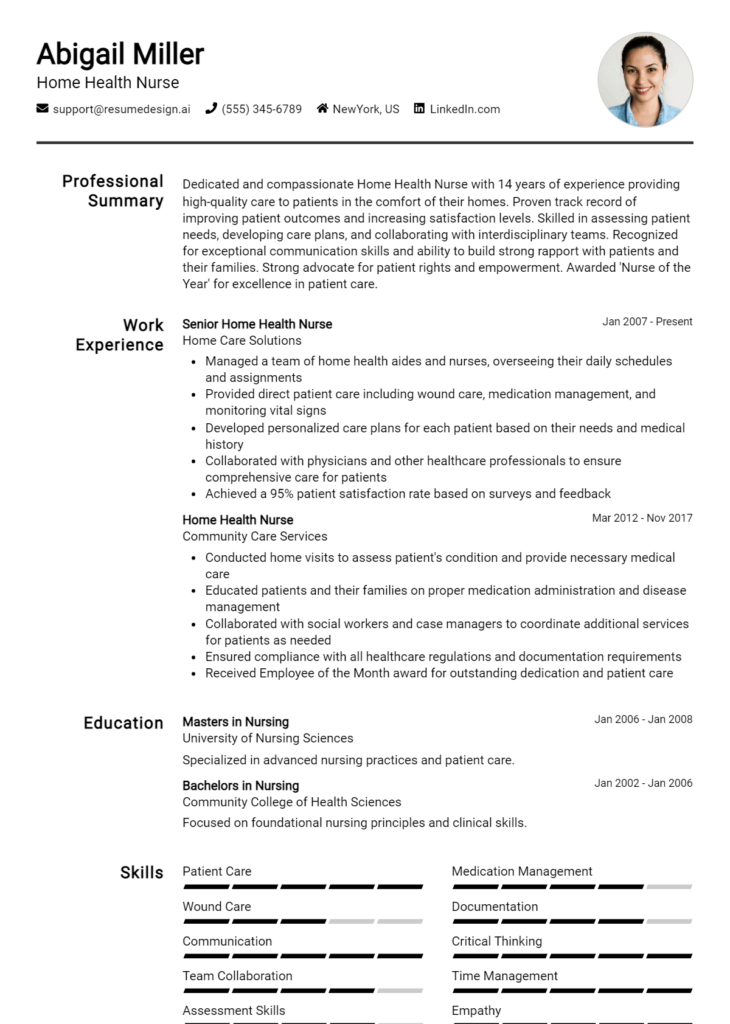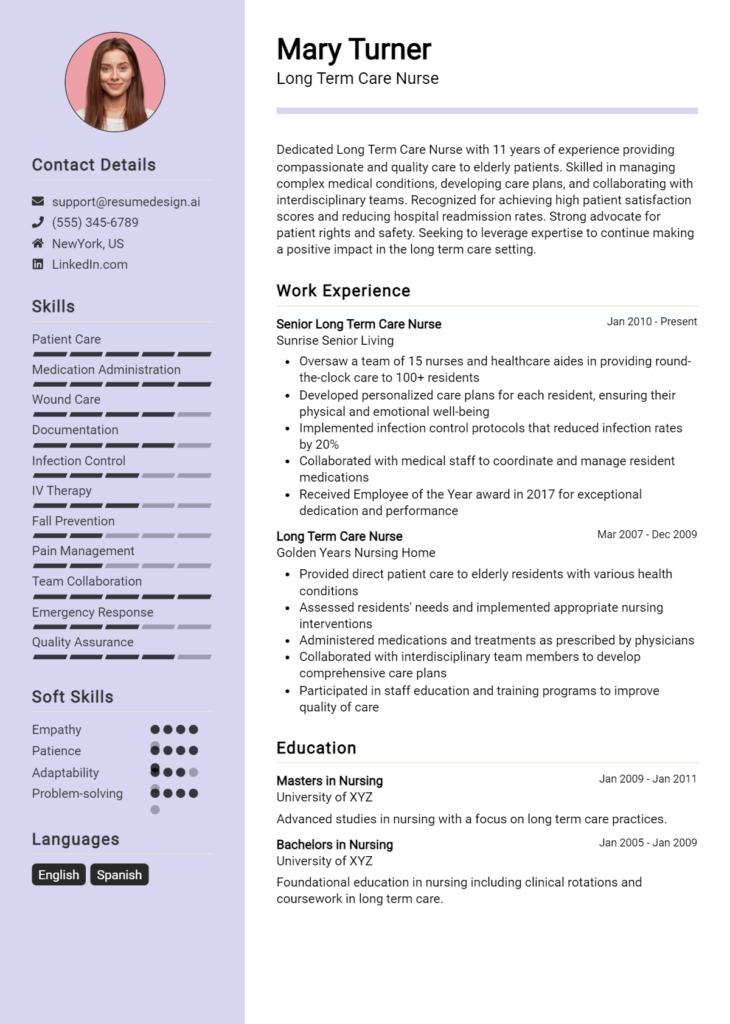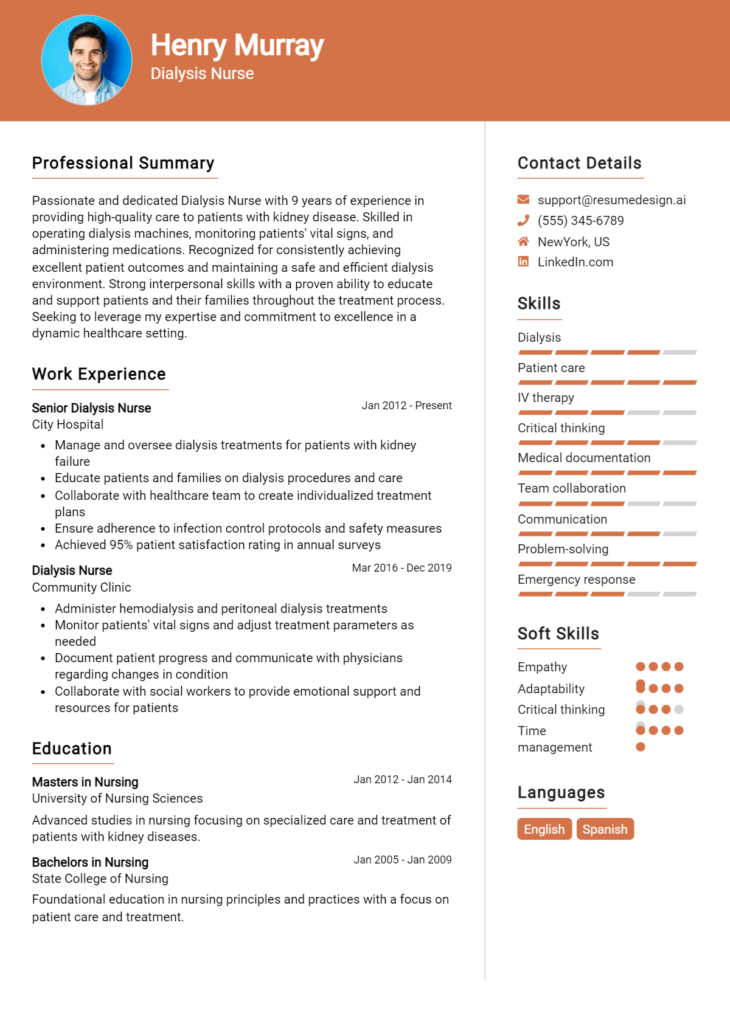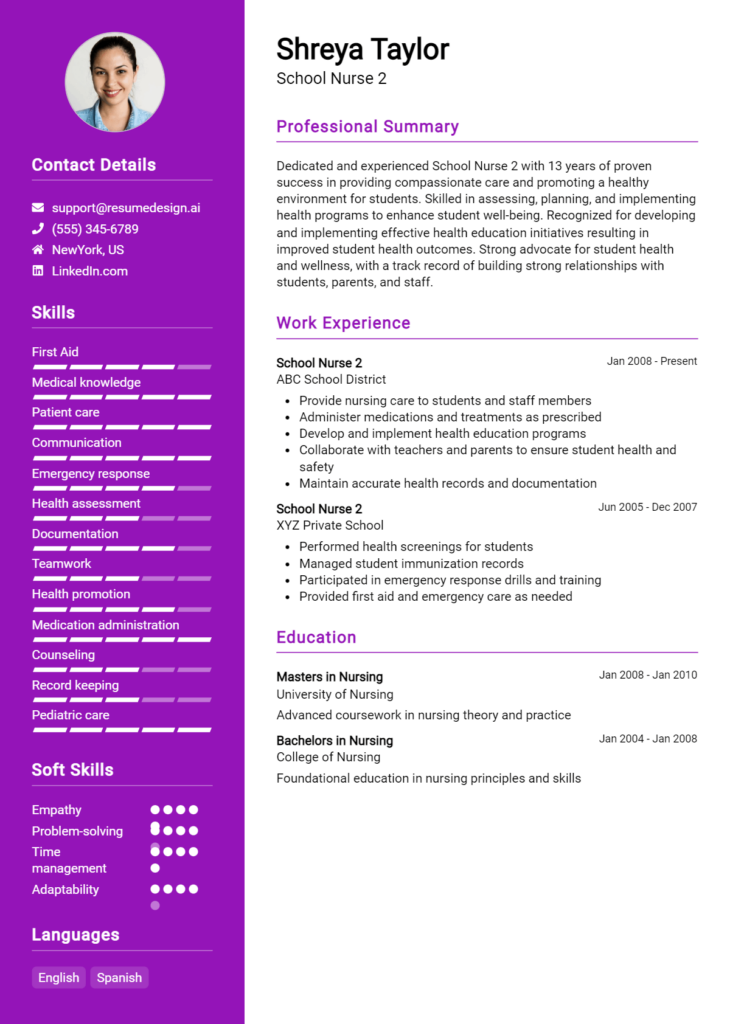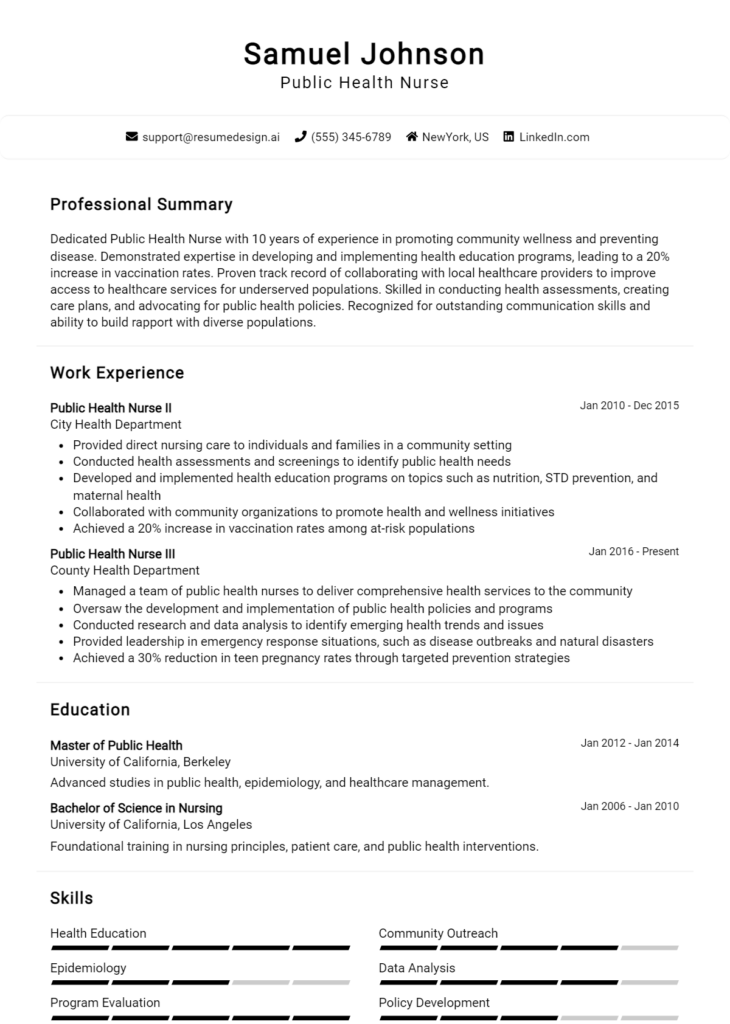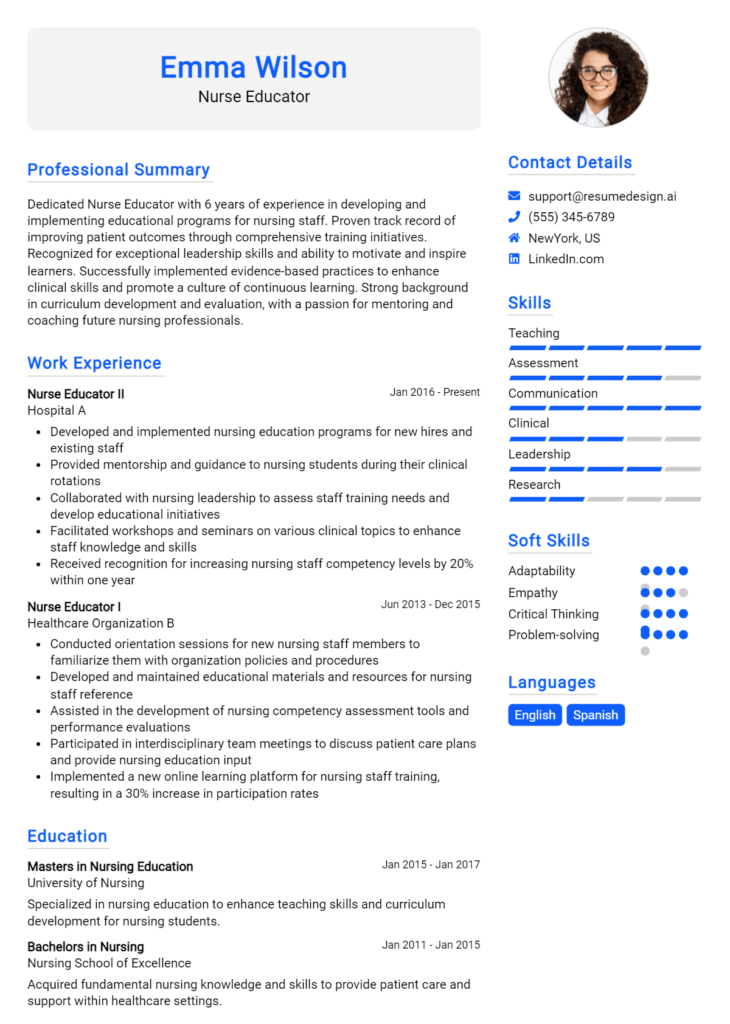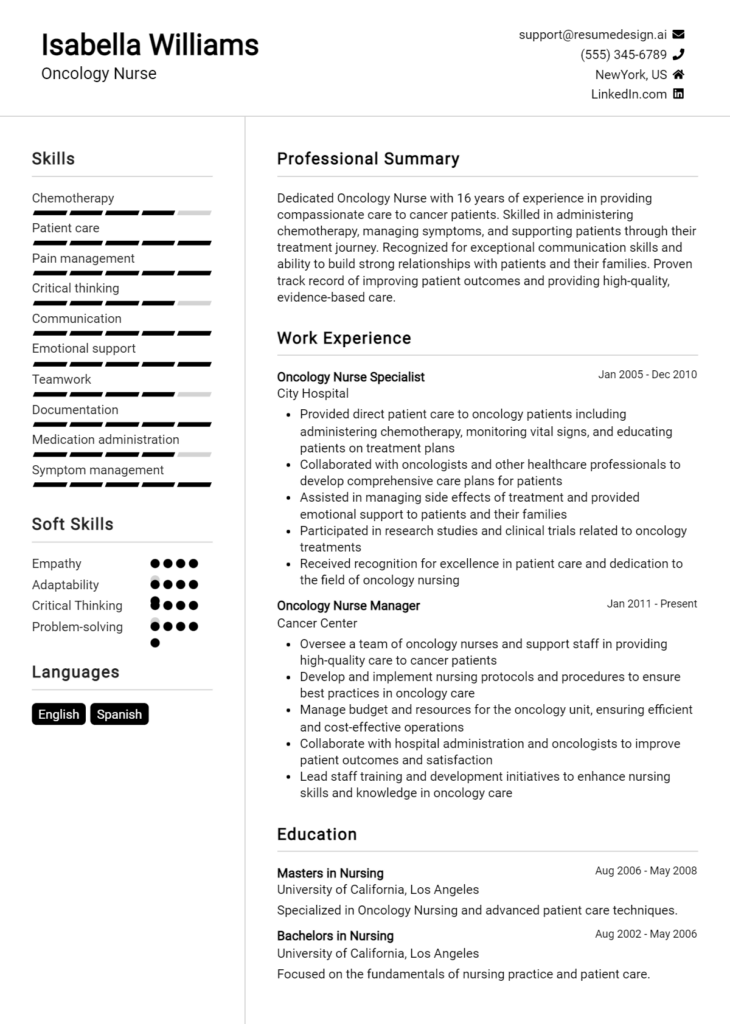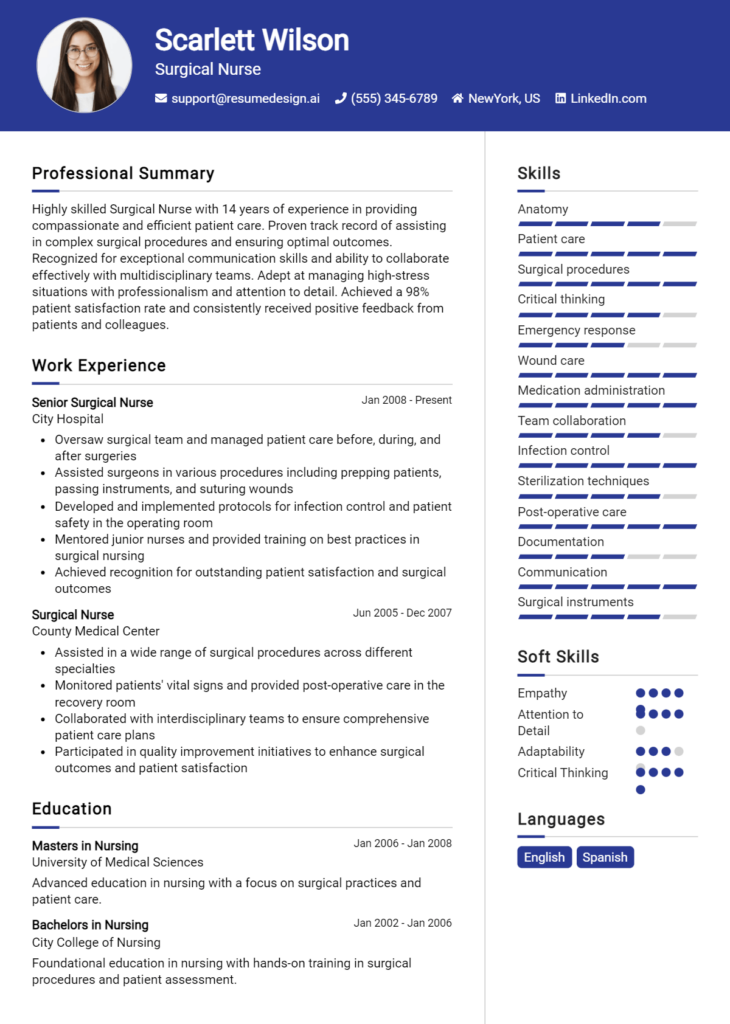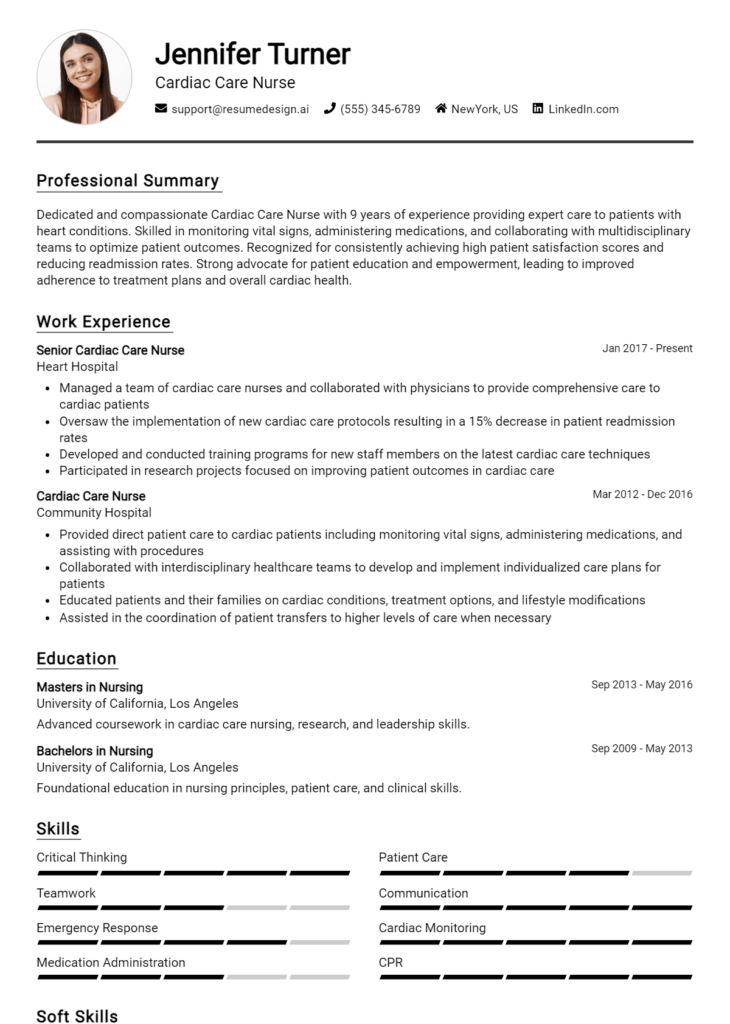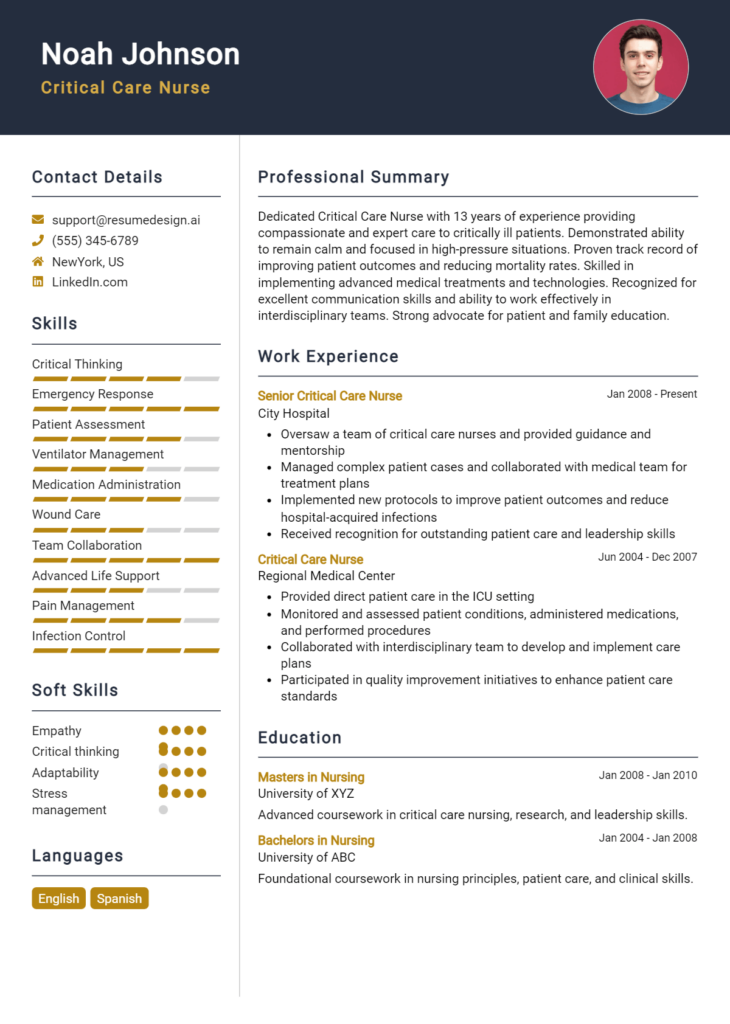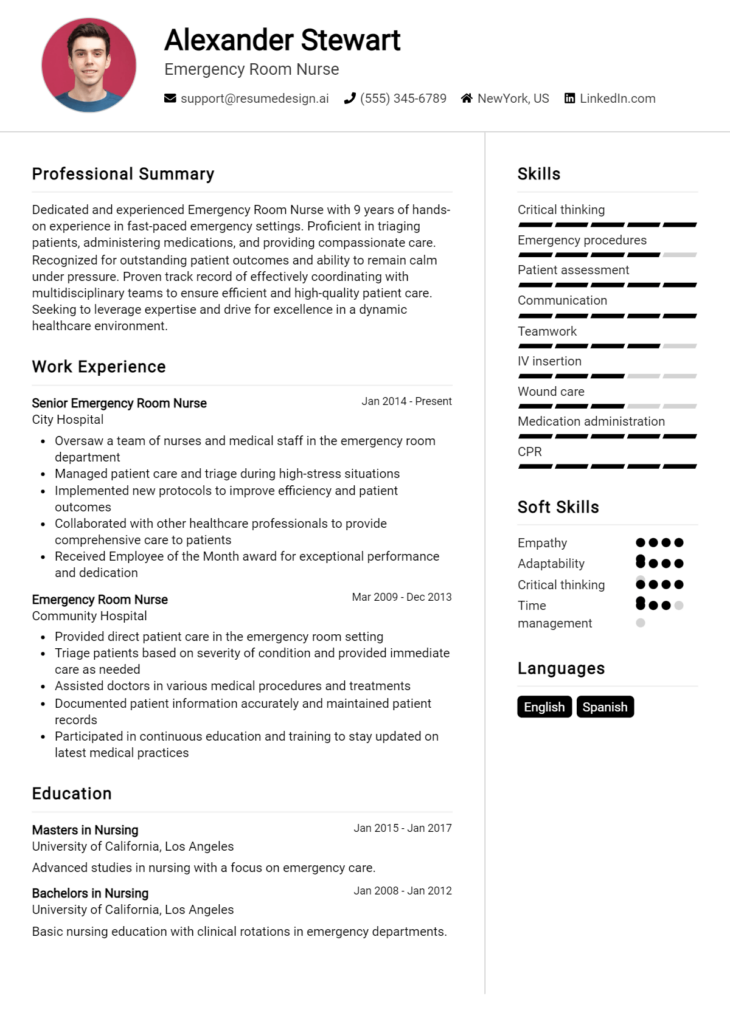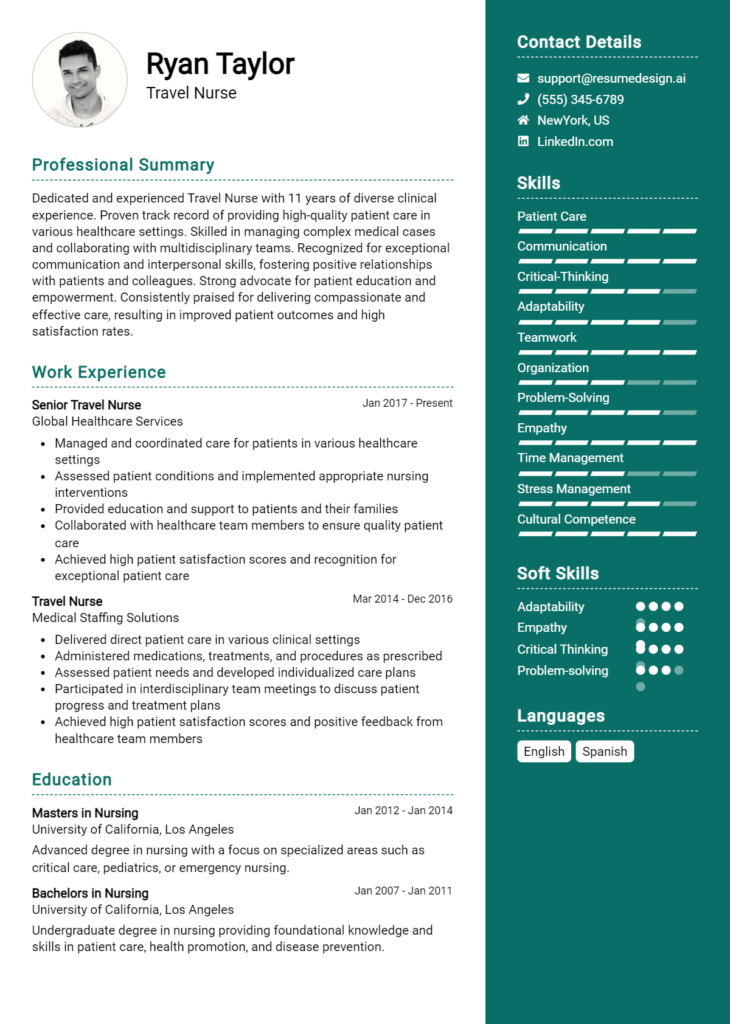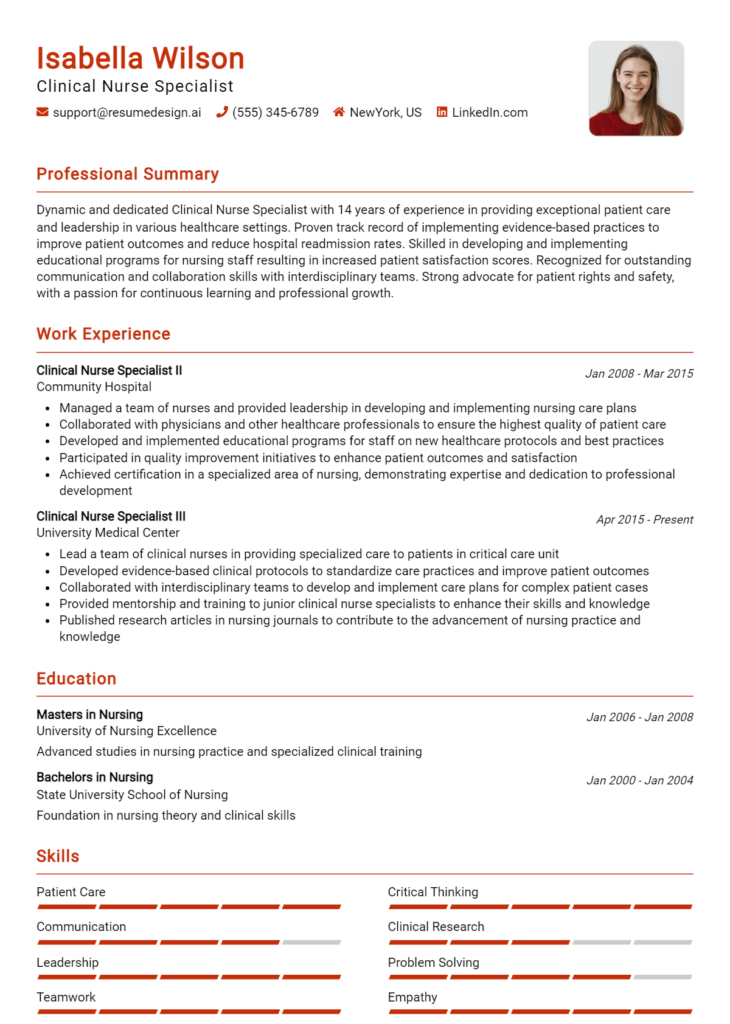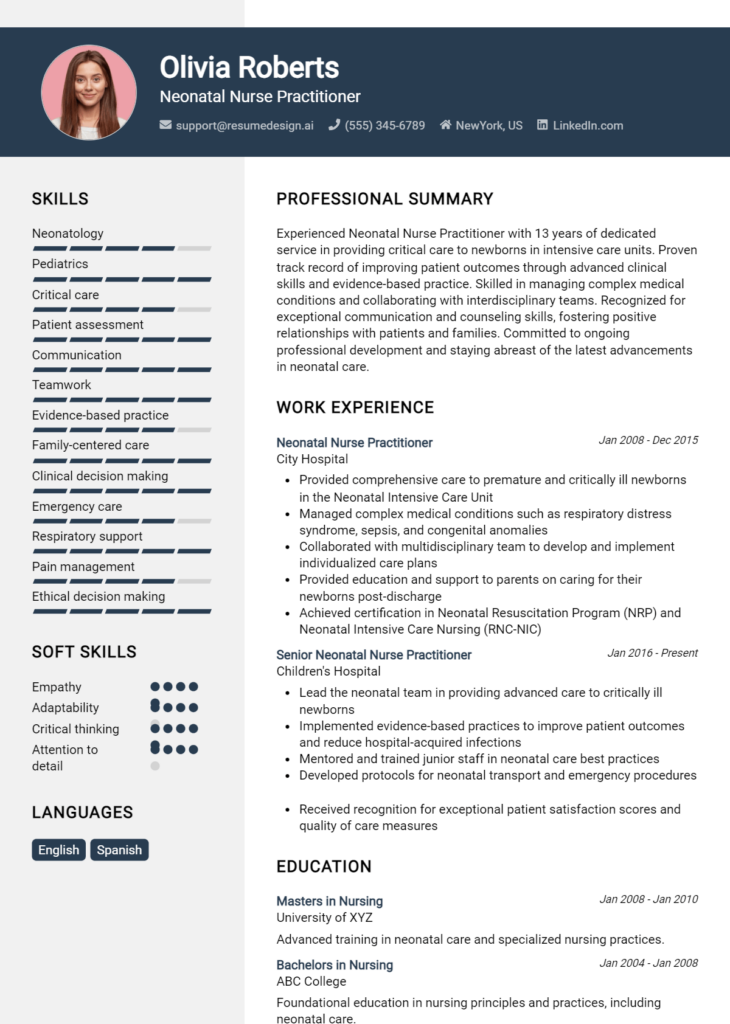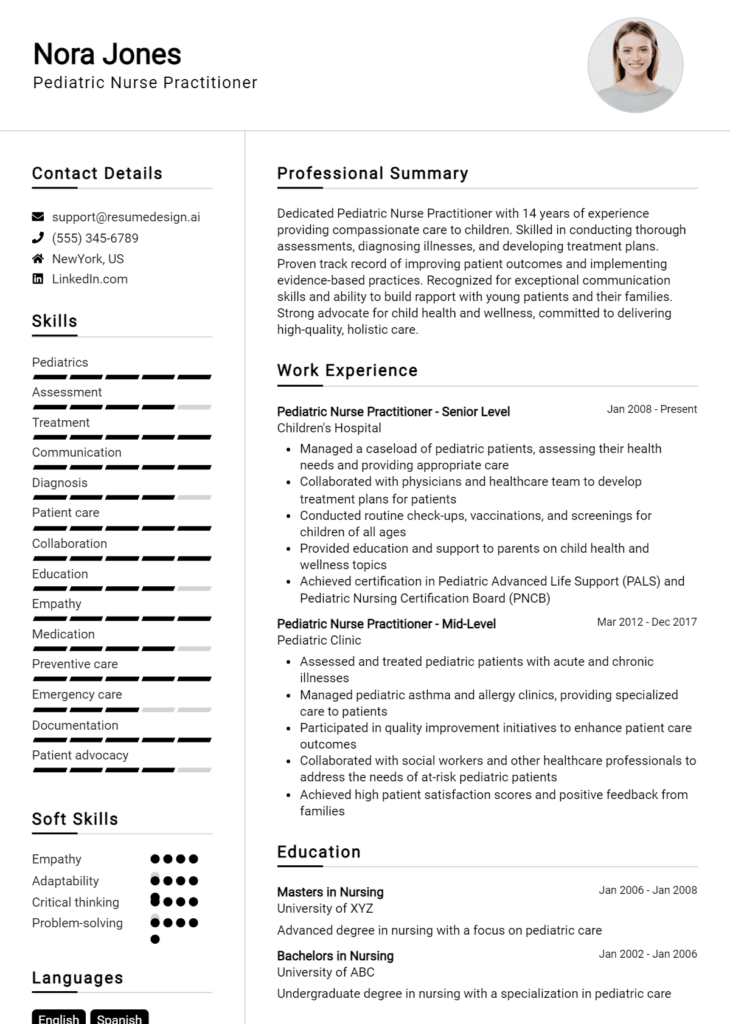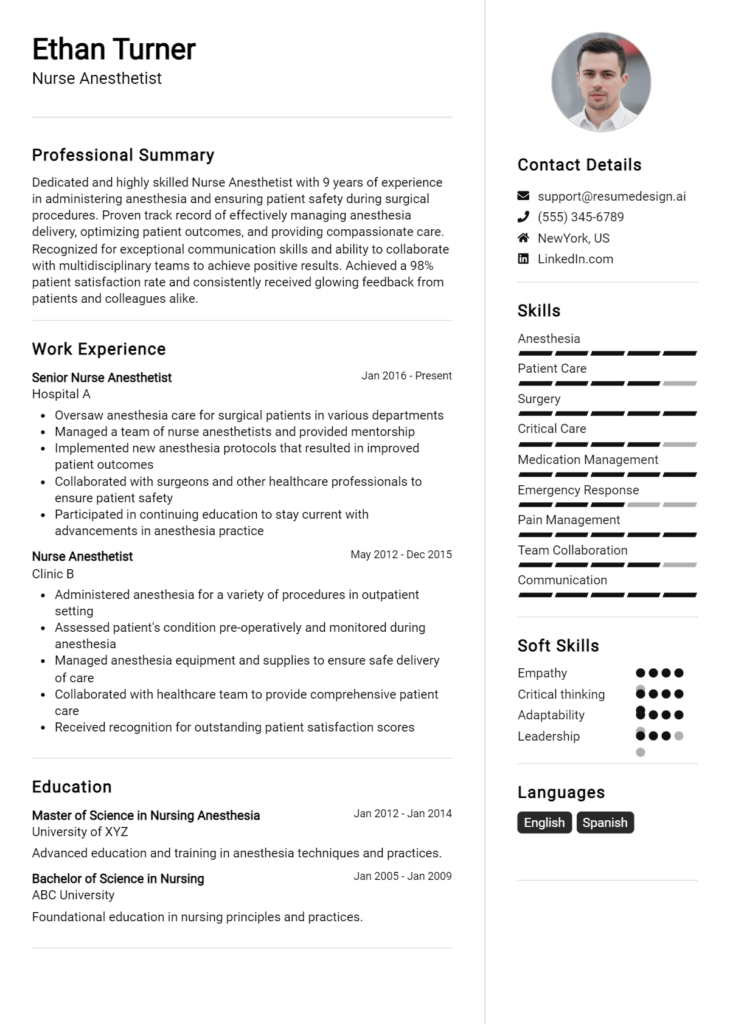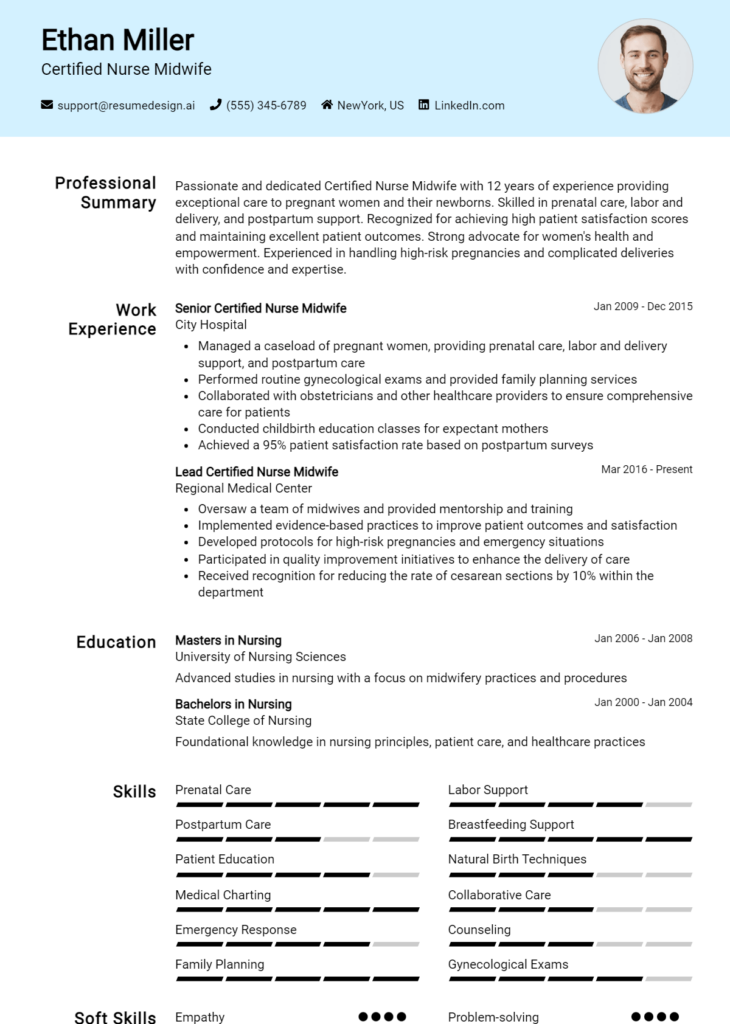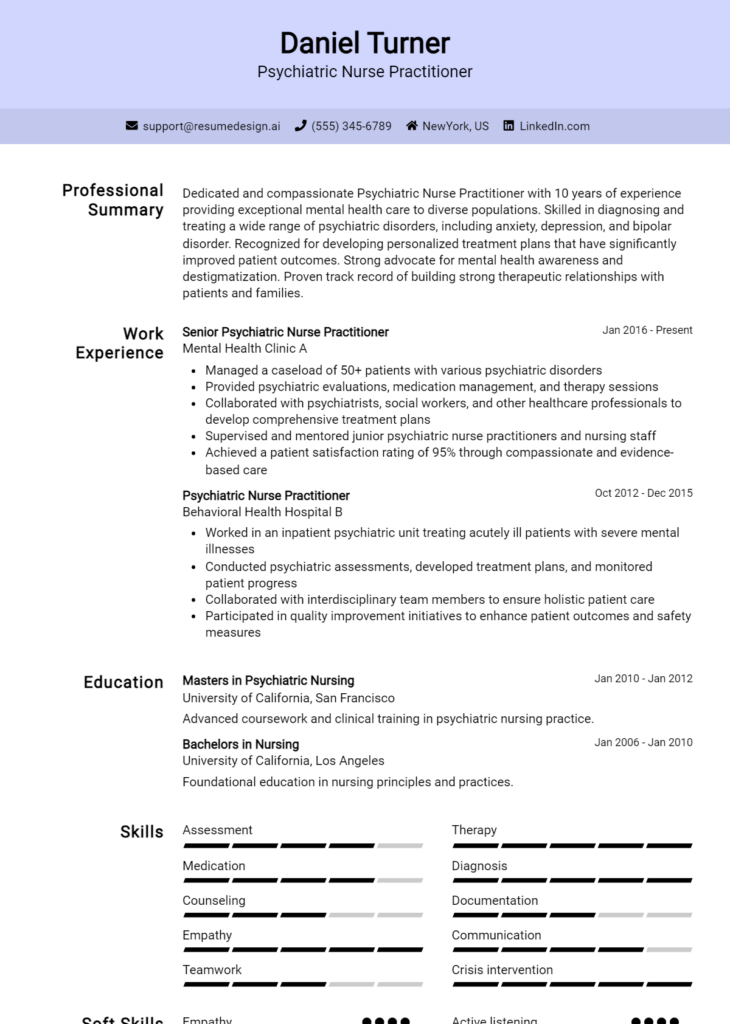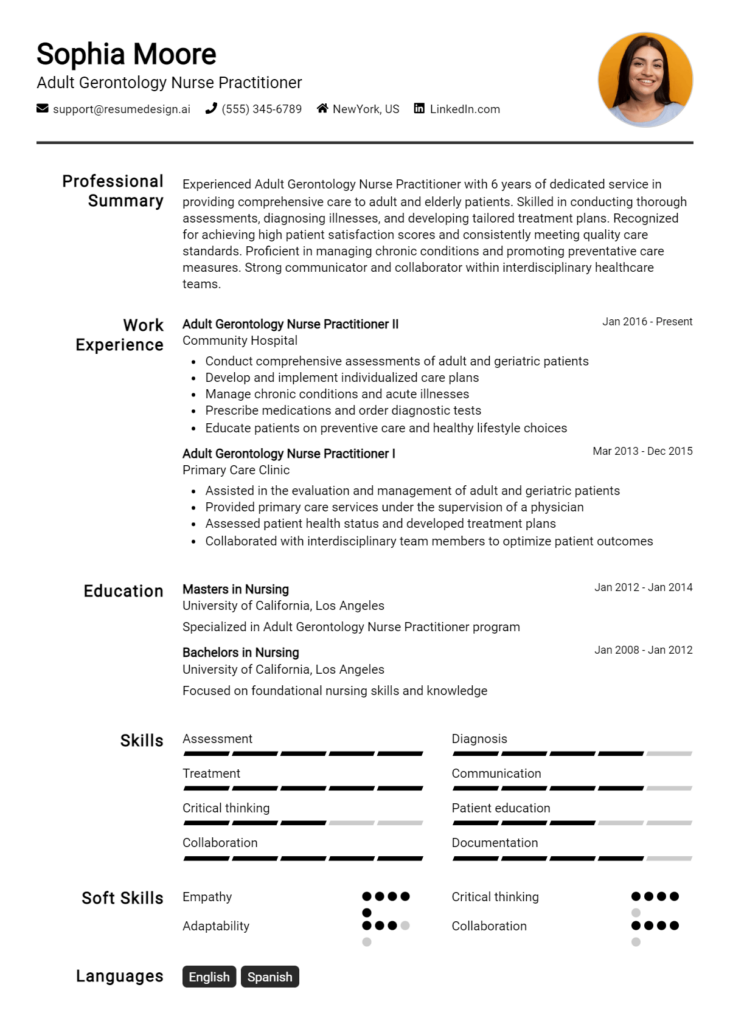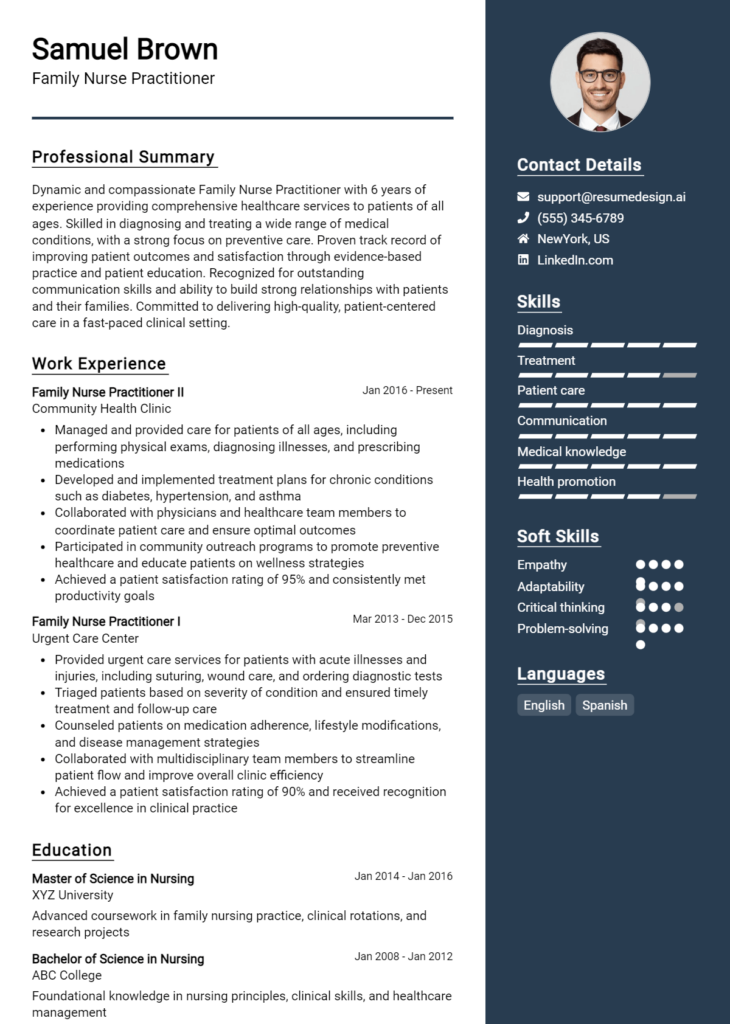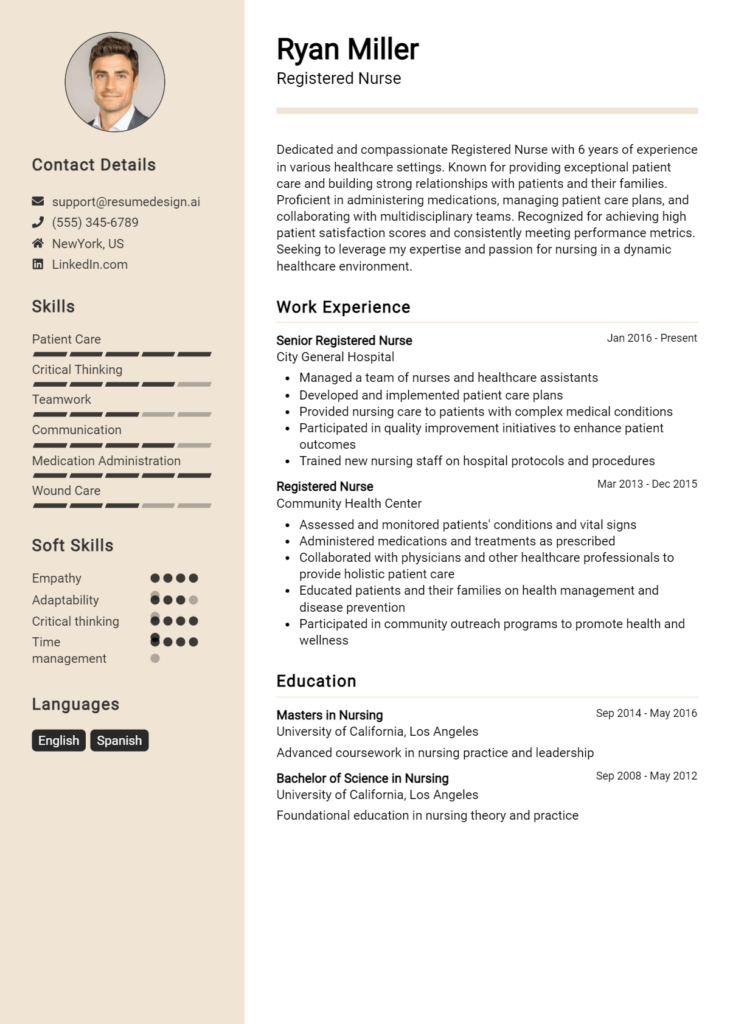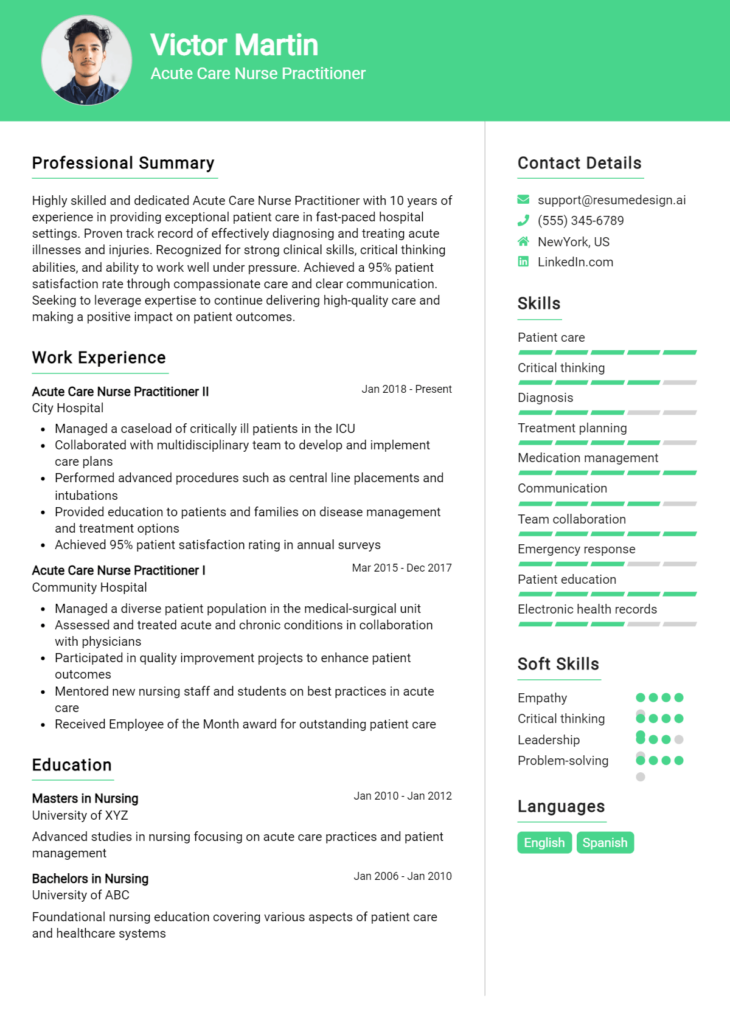Nurse Researcher Core Responsibilities
A Nurse Researcher plays a crucial role in bridging clinical practice and scientific research, integrating knowledge across various departments to enhance patient care. Key responsibilities include designing and conducting studies, analyzing data, and collaborating with healthcare professionals to implement evidence-based practices. Essential skills encompass technical expertise in research methodologies, operational management, and strong problem-solving abilities. These competencies are vital for achieving organizational goals, and a well-structured resume can effectively highlight these qualifications and experiences.
Common Responsibilities Listed on Nurse Researcher Resume
- Design and implement clinical research studies.
- Analyze and interpret research data.
- Collaborate with multidisciplinary teams on research projects.
- Ensure compliance with ethical standards and regulations.
- Prepare research proposals and grant applications.
- Conduct literature reviews and synthesize findings.
- Present research findings at conferences and seminars.
- Develop and maintain research documentation and databases.
- Provide training and mentorship to staff and students.
- Evaluate the effectiveness of research interventions.
- Engage with stakeholders to promote research initiatives.
High-Level Resume Tips for Nurse Researcher Professionals
In the competitive field of nursing research, a well-crafted resume is not just a document; it’s a vital tool that can set you apart from the competition. For Nurse Researcher professionals, the resume is often the first impression made on a potential employer, serving as a gateway to interview opportunities. It is essential that this document accurately reflects both your skills and achievements, showcasing your unique contributions to the field of nursing research. This guide will provide practical and actionable resume tips specifically tailored for Nurse Researcher professionals, empowering you to create a compelling narrative of your qualifications.
Top Resume Tips for Nurse Researcher Professionals
- Tailor your resume to each job description by incorporating keywords and phrases from the posting.
- Highlight relevant nursing experience, focusing on roles that involved research, clinical trials, or data analysis.
- Quantify your achievements with metrics and data to demonstrate the impact of your work (e.g., "Conducted research that improved patient outcomes by 20%").
- Showcase industry-specific skills, such as statistical analysis, research methodologies, and ethical considerations in clinical research.
- Include certifications relevant to nursing research, such as Clinical Research Coordinator (CRC) or Clinical Research Associate (CRA) credentials.
- Emphasize collaboration and communication skills, as these are crucial in a research setting involving multidisciplinary teams.
- List publications and presentations in reputable journals or conferences to establish your expertise and contributions to the field.
- Keep the format professional and easy to read, using clear headings, bullet points, and adequate white space.
- Limit your resume to one or two pages, ensuring that every detail is relevant and contributes to your overall narrative.
- Proofread for grammatical errors and typos, as attention to detail reflects your commitment to quality in research.
Implementing these tips will significantly enhance your resume, increasing your chances of landing a job in the Nurse Researcher field. By effectively showcasing your skills, experiences, and achievements, you present a professional image that resonates with potential employers and highlights your dedication to advancing nursing research.
Why Resume Headlines & Titles are Important for Nurse Researcher
In the competitive field of nurse research, a well-crafted resume headline or title serves as a critical first impression, capable of capturing the attention of hiring managers within seconds. A strong headline succinctly summarizes a candidate's key qualifications, showcasing their unique strengths and expertise relevant to the position. By providing an impactful phrase, it not only piques interest but also sets the tone for the rest of the resume, compelling the reader to delve deeper. Therefore, an effective headline should be concise, relevant, and directly aligned with the job being applied for, ensuring it resonates with the specific needs of potential employers.
Best Practices for Crafting Resume Headlines for Nurse Researcher
- Keep it concise: Aim for a headline that is no longer than a single sentence.
- Be specific: Tailor the headline to reflect the specific role and requirements of the position.
- Highlight key qualifications: Include essential skills, certifications, or experiences directly related to nurse research.
- Use action-oriented language: Choose strong verbs that convey proactivity and expertise.
- Incorporate relevant keywords: Use industry-specific terms that align with the job description.
- Focus on accomplishments: Mention any significant achievements or contributions to previous research projects.
- Align with your career goals: Ensure the headline reflects your professional aspirations and areas of expertise.
- Avoid clichés: Steer clear of overused phrases that may dilute the impact of your headline.
Example Resume Headlines for Nurse Researcher
Strong Resume Headlines
Experienced Nurse Researcher Specializing in Clinical Trials and Patient Outcomes
Innovative Nurse Researcher with Proven Success in Data Analysis and Evidence-Based Practices
Dedicated Nurse Researcher with 5+ Years of Experience in Pediatric Health Studies
Weak Resume Headlines
Nurse Researcher Looking for Opportunities
Experienced Healthcare Professional
The strong headlines are effective because they immediately communicate specific expertise, experience, and relevance to the role of a nurse researcher, making them memorable and engaging for hiring managers. In contrast, the weak headlines lack specificity and fail to convey any unique qualifications or accomplishments, making them easily forgettable and less likely to capture the attention of potential employers. By focusing on clarity and relevance, strong headlines can significantly enhance a candidate's chances of standing out in a competitive job market.
Writing an Exceptional Nurse Researcher Resume Summary
A well-crafted resume summary is crucial for Nurse Researchers, as it serves as the first impression for hiring managers. This brief paragraph succinctly highlights the candidate’s key skills, experience, and accomplishments relevant to the Nurse Researcher role. A strong summary captivates attention quickly, allowing candidates to stand out in a competitive job market. It should be concise, impactful, and tailored to the specific position being applied for, ensuring that it resonates with the job description and the unique needs of the employer.
Best Practices for Writing a Nurse Researcher Resume Summary
- Quantify Achievements: Use numbers and data to showcase your impact in previous roles.
- Focus on Key Skills: Highlight specific skills that are relevant to the Nurse Researcher position, such as data analysis or clinical trial management.
- Tailor to the Job Description: Customize your summary to align with the requirements and preferences outlined in the job posting.
- Use Action Verbs: Start sentences with strong action verbs to convey confidence and proactivity.
- Keep it Concise: Aim for 2-4 sentences that get straight to the point without unnecessary fluff.
- Highlight Relevant Experience: Mention specific experiences related to nursing research to establish credibility.
- Showcase Professional Development: Include any relevant certifications or training that enhance your qualifications.
- Reflect Your Passion: Convey your enthusiasm for nursing research and commitment to advancing healthcare through your work.
Example Nurse Researcher Resume Summaries
Strong Resume Summaries
Dedicated Nurse Researcher with over 5 years of experience in clinical trial management and data analysis, successfully leading a team that improved patient recruitment rates by 35% in oncology studies.
Results-driven Nurse Researcher with expertise in evidence-based practice and a proven track record of publishing 8 peer-reviewed articles, contributing to advancements in cardiovascular health outcomes.
Compassionate Nurse Researcher skilled in qualitative and quantitative research methods, having secured $250,000 in grant funding for a groundbreaking study on diabetes management among underserved populations.
Innovative Nurse Researcher with a focus on patient-centered care, recognized for implementing a new data collection system that increased efficiency by 20%, significantly enhancing research project timelines.
Weak Resume Summaries
Nurse with some research experience looking for a new job.
Experienced healthcare professional interested in nursing research and improving patient care.
The strong resume summaries effectively demonstrate the candidate's specific accomplishments, quantifiable results, and relevant skills, making them stand out to hiring managers. In contrast, the weak summaries are vague, lack detail, and do not convey any measurable impact or uniqueness, which may leave hiring managers unimpressed and unsure of the candidate's qualifications.
Work Experience Section for Nurse Researcher Resume
The work experience section is a crucial component of a Nurse Researcher resume, as it serves as a showcase for the candidate's technical skills, management capabilities, and track record of delivering high-quality research outputs. This section enables candidates to demonstrate their expertise in clinical practice, data analysis, and research methodologies while highlighting their ability to collaborate effectively with cross-functional teams. Quantifying achievements—such as the number of studies led, publications produced, or patient outcomes improved—and aligning experiences with industry standards are essential to create a compelling narrative that resonates with hiring managers.
Best Practices for Nurse Researcher Work Experience
- Highlight specific technical skills relevant to nursing research, such as statistical analysis or clinical trial management.
- Quantify achievements using metrics, such as percentage improvements, funding amounts, or the number of projects completed.
- Provide examples of leadership roles in research teams, illustrating your ability to manage and mentor others.
- Emphasize collaborative projects that demonstrate teamwork with other healthcare professionals and researchers.
- Use industry-standard terminology and frameworks to align your experience with current best practices in nursing research.
- Include continuing education or certifications that support your technical expertise and commitment to professional growth.
- Tailor your experiences to match the specific job description, highlighting the most relevant skills and accomplishments.
- Maintain a clear and concise format that allows hiring managers to quickly identify your key contributions.
Example Work Experiences for Nurse Researcher
Strong Experiences
- Led a multi-site clinical trial that resulted in a 30% improvement in patient recovery times, enhancing the overall quality of care.
- Published 5 peer-reviewed articles in high-impact nursing journals, contributing to advancements in evidence-based practice.
- Managed a team of 10 researchers to successfully secure $500,000 in grant funding for innovative health studies.
- Collaborated with interdisciplinary teams to implement new protocols that decreased hospital readmission rates by 15%.
Weak Experiences
- Worked on various research projects without specifying the outcomes or contributions made.
- Assisted in data collection and analysis with no mention of the impact of these activities.
- Participated in team meetings and discussions without detailing any leadership or significant input.
- Involved in research activities that were not clearly defined or quantified in terms of results.
The examples provided are considered strong because they clearly articulate specific achievements and quantify outcomes, demonstrating the candidate's direct impact on research and patient care. In contrast, the weak examples lack clarity, detail, and measurable results, making it difficult for hiring managers to assess the candidate's contributions and the value they could bring to future research initiatives.
Education and Certifications Section for Nurse Researcher Resume
The education and certifications section of a Nurse Researcher resume plays a pivotal role in showcasing the candidate's academic qualifications and commitment to ongoing professional development. This section not only highlights the necessary degrees and relevant certifications but also emphasizes the candidate's dedication to continuous learning and staying current in the ever-evolving healthcare landscape. By providing details on relevant coursework, specialized training, and industry-recognized credentials, candidates can significantly enhance their credibility and demonstrate their alignment with the specific demands of the Nurse Researcher role.
Best Practices for Nurse Researcher Education and Certifications
- Include only relevant degrees and certifications that pertain to nursing and research.
- List advanced degrees (e.g., MSN, DNP, PhD) prominently to reflect higher education.
- Highlight certifications from recognized bodies such as the American Nurses Credentialing Center (ANCC).
- Incorporate any specialized training or workshops that enhance research skills.
- Provide details of relevant coursework that aligns with research methodologies or clinical trials.
- Use clear and concise formatting to ensure easy readability of credentials.
- Update this section regularly to reflect new certifications and ongoing education.
- Tailor the education and certifications section to match the specific requirements of the job posting.
Example Education and Certifications for Nurse Researcher
Strong Examples
- Master of Science in Nursing (MSN) with a focus on Nursing Research, University of XYZ.
- Certified Clinical Research Coordinator (CCRC), Association of Clinical Research Professionals.
- Advanced Research Methods and Statistical Analysis coursework, ABC University.
- PhD in Nursing Science, specializing in Evidence-Based Practice, University of ABC.
Weak Examples
- Bachelor of Arts in Psychology, University of XYZ (not directly related to nursing).
- Certified Nursing Assistant (CNA) – outdated credential for a Nurse Researcher role.
- Basic Life Support (BLS) certification only, lacking advanced research qualifications.
- High School Diploma – not relevant for a professional Nurse Researcher position.
The strong examples are considered relevant and effective as they demonstrate advanced education and certifications that directly pertain to the field of nursing research. They reflect the candidate’s specialized training and commitment to evidence-based practice, making them suitable for the role. Conversely, the weak examples illustrate qualifications that are either outdated or irrelevant to the Nurse Researcher position, failing to showcase the necessary skills and knowledge required in research settings.
Top Skills & Keywords for Nurse Researcher Resume
As a Nurse Researcher, possessing a diverse set of skills is crucial for success in this specialized field. The ability to effectively conduct and analyze research not only contributes to the advancement of nursing practices but also ensures the safety and well-being of patients. A well-crafted resume that highlights both hard and soft skills can significantly enhance a Nurse Researcher's appeal to potential employers. By showcasing these competencies, candidates can demonstrate their expertise in conducting rigorous research and their capability to collaborate with interdisciplinary teams, making a substantial impact in healthcare settings. For more details on essential skills and the significance of work experience, consider the following key competencies.
Top Hard & Soft Skills for Nurse Researcher
Soft Skills
- Effective communication
- Critical thinking
- Attention to detail
- Team collaboration
- Problem-solving
- Adaptability
- Empathy
- Organizational skills
- Time management
- Leadership capabilities
- Ethical judgment
- Patient-focused mindset
- Conflict resolution
- Mentoring and training
- Interpersonal skills
- Cultural competence
Hard Skills
- Statistical analysis
- Research methodology
- Data collection and management
- Clinical trial design
- Evidence-based practice
- Grant writing
- Literature review
- Knowledge of healthcare regulations
- Familiarity with research software (e.g., SPSS, R)
- Proficiency in medical coding and terminology
- Quality improvement methods
- Patient safety protocols
- Database management
- Survey design and implementation
- Biostatistics
- Knowledge of ethical research standards
- Publication and presentation skills
Stand Out with a Winning Nurse Researcher Cover Letter
I am writing to express my interest in the Nurse Researcher position at [Institution Name], as advertised on [Job Board/Website]. With a solid nursing background and extensive experience in clinical research, I am excited about the opportunity to contribute to innovative studies that enhance patient care and advance nursing practice. My educational qualifications include a Master’s in Nursing Research, and I hold a certification in Clinical Research from [Certifying Body], which has equipped me with the necessary skills to effectively design, implement, and analyze research studies.
Throughout my career, I have been actively involved in research initiatives aimed at improving patient outcomes. During my time at [Previous Institution/Organization], I led a multidisciplinary team in a study that examined the effects of a new intervention on post-operative recovery times. This experience honed my abilities in data collection, statistical analysis, and manuscript preparation, culminating in a publication in [Journal Name] that highlighted our findings. I am adept at utilizing various research methodologies, including qualitative and quantitative approaches, which allows me to adapt to the specific needs of each project.
Collaboration is a cornerstone of successful research, and I take pride in my ability to work effectively with diverse teams. I have successfully partnered with physicians, pharmacists, and other healthcare professionals to ensure that our research aligns with clinical practice and addresses the needs of patients. My strong communication skills enable me to present complex research findings in an accessible manner, facilitating discussions that drive evidence-based improvements in patient care.
I am excited about the possibility of bringing my expertise to [Institution Name] and contributing to your ongoing research efforts. I am particularly drawn to your initiatives focused on [Specific Research Area or Program], and I believe that my background in nursing and research will allow me to make a meaningful impact. Thank you for considering my application; I look forward to the opportunity to discuss how I can contribute to your team.
Common Mistakes to Avoid in a Nurse Researcher Resume
When crafting a resume as a Nurse Researcher, presenting your qualifications and experience clearly and effectively is crucial. However, many candidates make common mistakes that can hinder their chances of securing an interview. Understanding these pitfalls can help you create a standout resume that highlights your skills, education, and experience in the nursing research field. Below are some common mistakes to avoid:
Lack of Specificity: Failing to include specific details about your research projects, methodologies, or outcomes can make your resume vague and less impactful. Be clear about your contributions and results.
Overloading with Jargon: While it's important to demonstrate your knowledge, using excessive technical language or jargon can alienate hiring managers. Aim for clarity and conciseness.
Neglecting Formatting: A cluttered or disorganized resume can detract from your qualifications. Use clear headings, bullet points, and consistent formatting to enhance readability.
Ignoring Relevant Experience: Omitting relevant clinical experience or research roles can weaken your application. Ensure that all pertinent experiences are highlighted, even if they are not directly in research.
Not Tailoring the Resume: Sending out a generic resume without tailoring it to the specific job description can be detrimental. Customize your resume to align with the requirements of each position you apply for.
Skipping Soft Skills: Focusing solely on technical skills can overlook the importance of soft skills required in research, such as communication and teamwork. Make sure to showcase these abilities.
Inadequate Education Details: Failing to provide comprehensive information about your degrees, certifications, and ongoing education can leave out critical qualifications. List your educational background clearly.
Lack of Quantifiable Achievements: Not including quantifiable metrics to demonstrate the impact of your research can make it difficult for employers to gauge your effectiveness. Use numbers and statistics where possible to illustrate your successes.
Conclusion
As a Nurse Researcher, your role is crucial in advancing medical knowledge and improving patient care through rigorous research methodologies. Throughout this article, we have explored the essential skills and qualifications required for this position, including a strong background in clinical practice, proficiency in research design, and the ability to analyze data effectively. We've also discussed the importance of collaboration with multidisciplinary teams and the need for effective communication skills to share findings with both the scientific community and the public.
In summary, the key points highlighted include:
- The significance of evidence-based practice in nursing research.
- The necessity of obtaining advanced degrees and certifications in research methodologies.
- The role of ethical considerations in conducting research involving human subjects.
- The impact of Nurse Researchers on healthcare policies and practices.
Now is the perfect time to revisit and refine your Nurse Researcher resume to reflect your qualifications and experiences accurately. Stand out to potential employers by utilizing resources such as resume templates, a resume builder, and resume examples. Additionally, don’t forget about the importance of a compelling introduction with the help of cover letter templates. Take action today to ensure your resume showcases your expertise and sets you on a path toward a fulfilling career in nursing research!

